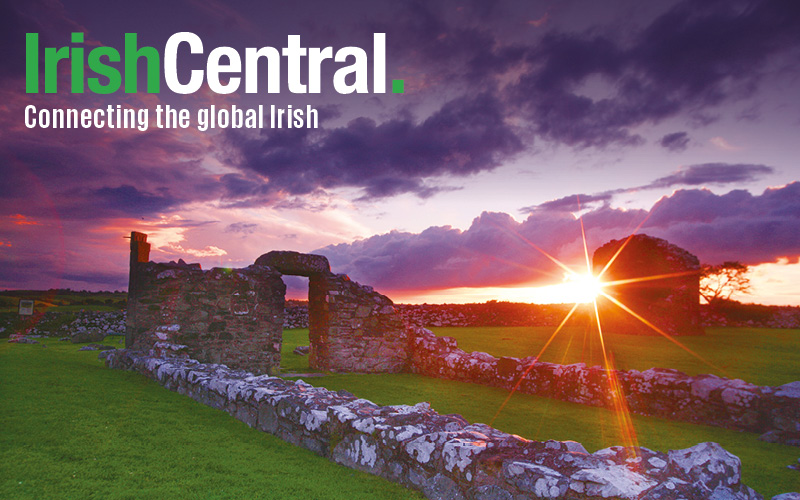Dubliner Johnny O'Callaghan is a successful LA-based actor, psychologist and adoptive dad. This week he’s at the Irish Repertory Theatre in New York starring in his hilarious and uplifting one man show about his epic struggle to adopt a Ugandan orphan. He tells Cahir O'Doherty that because he was single, gay and a bit of a nomad no one expected him to become a father, but a trip to Africa to help others ended up turning his own life around.
Playing it safe can be the most dangerous thing you can ever do. Just ask Irish actor and playwright Johnny O'Callaghan.
As he reveals in his hit one man show Who's Your Daddy? about his journey to Africa and his life-changing decision to adopt an orphan there (now playing at the Irish Repertory Theatre) he spent decades of his life trying to please others, often at the expense of himself.
It's such an Irish thing to do, choose a tried and tested career path rather than trust your own heart, but at the time (the 1990s) it seemed to make sense to him.
Born and raised in the gritty working class suburb of Tallaght in Co. Dublin, O'Callaghan went on to the University of Ulster in Belfast to study computer science. He was the first person in his family to reach third level. He was playing it safe.
“By day I was doing a 40 hour computer science degree,” he tells the Irish Voice. “When I didn’t know what a computer was to tell you the truth.”
But it was the kind of course his parents thought would lead to a good job, so he stuck with it. “I was from a working class family and I was the first person to go to university from my family and probably from the whole area too,” O’Callaghan recalls.
Each day he attended lectures and at night he rehearsed plays, and all the while the performing bug kept growing. By the time he graduated he had made up his mind to attend theater school in Boston.
That led him to lead roles in regional theater and then on hit TV shows. For a while he was a bit of a gypsy, he says.
Eventually winding up in LA, the way actors do, O’Callaghan got lucky and was picked up by Jack Nicholson's agent. Work was sporadic, though. His life wasn't exactly on the fast track to fame and fortune that he had planned out for himself.
Then his troubles really started. Around the time he decided to make a serious commitment to the famous rock star boyfriend he was secretly seeing, he came home early one afternoon to find the object of his affection in a compromising position with two men who looked like fraternal twins.
To that major heartache he added another when he lost his dog. Shortly after that he lost his faith in himself. He began to wallow in a deep depression, he says.
“I was up for every major show, but my career wasn’t going quite the way I thought it should and I was feeling completely sorry for myself. I was navel gazing and getting massages and being depressed. You know, first world problems that I find hysterical now,” O’Callaghan says.
In his haze of self-pity he randomly ran into a friend who told him she was going to Uganda in a few days to make a documentary film. It was during the time of national elections out there and the threat of a civil war was very real. People thought she was crazy for going.
Then out of the blue she asked O’Callaghan if he'd be interesting in coming as a cameraman. “Possible death, I told myself, what could be more exciting?”
Unable to face losing yet another TV show to a bigger celebrity, O'Callaghan packed up. Three days later he was in Africa. That’s where his new play begins.
If you’ve never been to a Third World country, you won’t understand how disorienting and emotionally draining it is to see human beings living in conditions so miserable they can haunt you for the rest of your life. In Uganda navel gazing went out the window in the first hour.
“We drove 10 hours into a deep, primitive part of the country where tourists never ventured. I was in shock at how people were living. They were lucky if they ate one meal each day,” O’Callaghan recalls.
“It was overwhelming. People were dying of AIDS. Coffins were lying closed on the side of the road. The story our guide told us freaked me out. I would recommend that anyone who’s feeling sorry for themselves or brokenhearted take a trip like it.”
Who's Your Daddy? explores what happens to O'Callaghan when he gets there.
“I ended up filming in this orphanage. It wasn’t an orphanage the way you might picture one in the west. It was a concrete block with no electricity or amenities,” he says.
“While I was there a toddler crawled toward me. I meditate a lot and I heard this voice -- he’s your son.”
At first O'Callaghan laughed at the idea. “I told myself he’s brown, he’s smelly, he’s sick. If I ever have a child I never imagined he would look like this,” he says.
“Then I noticed he had a little birthmark near his left eye that looked like Ireland. I had never seen one like that before. If you start to perceive the world as magical it starts to become magical. In reality I wasn’t ready to become a dad, but who is?”
O'Callaghan's epic struggle to adopt and nurse this Ugandan child back to health ranks among the most selfless and heroic tales you will ever hear. O'Callaghan decided to become the hero for this kid that he had always wanted to find for himself.
But when he told Irish people (and his own family) about his plans they were very comfortable telling him off.
“Who do you think you are? Angelina f***ing Jolie?; my mother asked me. They mentioned Madonna. None of them would take me seriously,” O’Callaghan says.
“When I told them I had met this little boy who I felt was my son they said crazy things, whatever came into their heads. I didn’t take it personally. I know what people say is generally a reflection of themselves.”
When the Irish media heard about his adoption and then the one man play that tells the story, quite a few of them called him up with opening questions like this: “So, you met the birth father – what did he say when you told him you’re gay?”
Sensationalism was the first item on their menu. Common decency was dead last.
“I was ready to end these interviews. My son's birth father was sick with AIDS and hadn’t seen him for three years,” O’Callaghan says.
“We met in a hut in the middle of nowhere. He didn’t speak English. I wanted to save the kid’s life. My play is about how love can save somebody, and how in the process he saved me.”
In deciding to adopt the boy he would eventually call Odin, after the Norse god of wisdom, for the first time O'Callaghan was following his own heart.
“As far back as going to university I was doing what people wanted me to do. This was the first time I was doing what I felt I should do,” he says.
“I stopped listening to people who weren’t in favor and I didn’t have any doubts. It wasn’t a choice anymore. The alternative was that he might die. It became about saving someone’s life. I was going to do it.”
Some groused that he was a privileged white man who had impulsively decided to adopt a little brown kid, but no one really saw what the commitment actually entailed.
“All of a sudden I was raising him and dealing with him. It became all about raising him,” O’Callaghan says.
Back in LA people would follow them in the supermarket, fascinated to see that a little brown kid had a white dad. They would ask him if they could buy Odin chocolate or give him a hug. Others would ask where the child’s mother was.
“They felt like they could say whatever they wanted to me,” says O'Callaghan. “Why not accept that we were a little family?”
“What was I supposed to say anyway?” he wondered. “His mom’s dead? In front of the little kid? I wasn’t trying to be an activist. My concern was to get him out of Uganda. It’s actually a beautiful thing to adopt. These kids do well whether their parents are gay or straight.”
Now Odin is thriving, O'Callaghan says. Everyone who meets him is in awe of him.
“I have a terrific therapy practice in Los Angles. I see clients two days a week and it’s been a beautiful journey,” he says.
“Work just comes to me now. Acting wise, I rarely audition. So the key message is to follow your heart to success.
“We all have our own path. I didn’t have the confidence in Ireland to do that, but I do now. My son owns who he is, that’s a gift I didn’t have growing up.
“Maybe he’ll go back to Uganda with it, or maybe he’ll chose to stay here in the U.S. I’ll support him whatever his decision is.”
(Who’s Your Daddy? is playing at the Irish Repertory Theatre until May 12. For tickets and showtimes visit www.irishrep.org.)




Comments